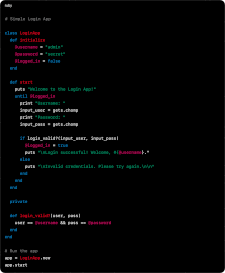Ruby
In the physical world, a ruby is a red gemstone. In the digital world, Ruby is a dynamic, object-oriented programming language designed for simplicity and readability. It was created in the mid-1990s by Yukihiro Matsumoto, who wanted a language that was powerful yet enjoyable to write.
Ruby's clean syntax is easy to read, and its "everything is an object" design makes the language consistent and flexible. Its syntax often resembles natural language, which helps developers write code that is concise and easy to understand. Ruby is an ideal programming language for beginners while still being powerful enough for experienced programmers.
Below is an example of a short Ruby program:
# A simple Ruby example from TechTerms.com
greeting = "Hello"
names = ["Andrea", "Bridget", "Cassie"]
names.each do |name|
puts "#{greeting}, #{name}!"
end
The above code would output the following:
Hello, Alice!
Hello, Bob!
Hello, Charlie!Ruby source code can be executed using the official Ruby interpreter ("MRI") or alternatives like JRuby, which runs on the Java Virtual Machine. Ruby is open source, free to use, and runs on most major operating systems, including Linux, Windows, and macOS.
Today, Ruby is widely used for building web applications through the Ruby on Rails framework, which powers platforms like Shopify, GitHub, and Basecamp. It's also used for automation scripts, data processing, DevOps tools, and even some game development.
For more information or to download Ruby, visit the official Ruby website.
 Test Your Knowledge
Test Your Knowledge